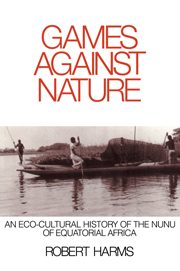Book contents
- Frontmatter
- Contents
- List of Maps
- Preface
- Preface for the paperback edition
- 1 Introduction
- 2 The Antecedents
- 3 The Tactics
- 4 The Strategies
- 5 The Drylands
- 6 The River
- 7 The Core
- 8 The Region
- 9 The Traders
- 10 The Troubles
- 11 The Opportunities
- 12 The Battle
- 13 Conclusion: Nature and Culture
- Abbreviations
- Sources Cited
- Archives
- Index
8 - The Region
Published online by Cambridge University Press: 03 November 2009
- Frontmatter
- Contents
- List of Maps
- Preface
- Preface for the paperback edition
- 1 Introduction
- 2 The Antecedents
- 3 The Tactics
- 4 The Strategies
- 5 The Drylands
- 6 The River
- 7 The Core
- 8 The Region
- 9 The Traders
- 10 The Troubles
- 11 The Opportunities
- 12 The Battle
- 13 Conclusion: Nature and Culture
- Abbreviations
- Sources Cited
- Archives
- Index
Summary
CONFLICT AT ONE level enhances solidarity at another. A feud between two families, for example, creates solidarity within each family; a conflict between two villages unifies each of them. This principle was in evidence in the nineteenth century, when the swamps experienced simultaneous conflict on a variety of levels. In addition to the small-scale feuds discussed in the previous chapter, there were wars that pitted neighborhood against neighborhood and environmental zone against environmental zone. These conflicts reflected in part the problems of maintaining order and balance in a society with no centralized institutions. They also reflected the dominant ideology of strength and independence that had motivated earlier generations of settlers to turn swampland into estates. But at a more fundamental level they represented an effort to cope with the effects of overcrowding and lack of new fishing grounds.
NEIGHBORHOOD WARS
Unlike the local feuds, which had identifiable causes and solutions, the larger-scale wars developed an institutionalized, almost ritualized character. The wars that pitted neighborhood against neighborhood became annual events. They were not fought to seize dams, ponds, or fields. They were tests of strength in which the participants fought, killed, and then returned home.
The wars helped create and reinforce neighborhood solidarity. One way in which they accomplished this was to put a disparate group of warriors under the protection of a single charm.
- Type
- Chapter
- Information
- Games against NatureAn Eco-Cultural History of the Nunu of Equatorial Africa, pp. 135 - 156Publisher: Cambridge University PressPrint publication year: 1988

